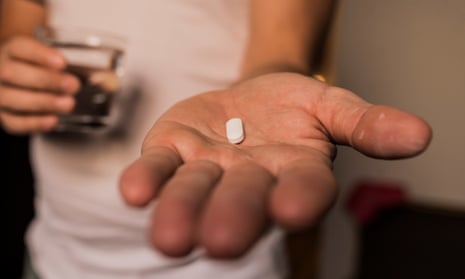In my first year of university, just after I had been prescribed fluoxetine for depression, I had an argument about it with a close friend. He told me that taking antidepressants would make my feelings false, my emotions manufactured. I wouldn’t be able to tell if what I was feeling was real – and that was wrong. At the time I did not know how to articulate that all of our feelings are linked to chemicals: that even eating a chocolate bar can give me a blood-sugar spike and alter my behaviour, that feeling the sunshine on my skin can give me hope and energy. Furthermore, that the contraceptive pills his girlfriends took were liable to make them angry, not to mention less horny. I did not know how to say that the antidepressant I took in order to cope with my life was not that different to the ketamine and cocaine he used to cope with his. In any case, it was a pretentious argument of the kind one has at university, and both of us lacked the scientific knowledge to really underpin our views. It was all posturing.
I think of it now because antidepressants are in the news again: whether they work or don’t work, whether other treatments – therapy, mindfulness, exercise, volunteering, being a 96-year-old Italian with a diet of fish and olive oil – are more effective than that “magic” pill. The chemical imbalance theory is posited, then debunked, in a never-ending cycle, as we, the mentally ill and medicated, watch on with hope but also exasperation. Because for all the scientific advances, therapeutic studies and happiness indexes, the only thing an individual can say with any certainty is whether or not antidepressants worked for them.
One day a week, I help to edit the Guardian letters and leaders pages. Recently, readers have been writing in to tell us the methods that helped them learn their times tables. It struck me, reading these letters, how different our brains are from one another. One person would write in with a “failsafe” method for learning, say, the nine times table. Others would reply saying it was no use, and suggest another method they thought would work for everyone.
The diversity of human thought processes is a reason why I tend not to invest too much in any one person’s answer to mental health problems. Maybe yoga, or some kind of therapy, worked for you. What has worked for me, three times now, is antidepressants. First fluoxetine, then, five years later, escitalopram. Then, another five years later, following another, milder trauma which prodded the previous one awake and caused severe agoraphobia, citalopram. (I am trying not to think that A Bad Thing will occur every five years for the rest of my life, because that is the kind of pessimism that my CBT therapist has taught me to avoid).
Yes, I’ve had therapy too, and it’s been incredibly helpful. I’m lucky that I had access to free trauma-focused CBT without too much of a wait. What an unbelievable privilege that is. But what really helped when my brain was misfiring to the point where terror existed in every aspect of my life – where I would stand in my back garden (the only place that I could go, most days) and worry that the planes overhead might fall from the sky – was antidepressants. I say this because I would not want anyone, going through anything similar, to resist for as long as I did, out of some intangible belief that drugs were bad and I could cope with constant fear on my own. Once I accepted that I needed help and began treatment, I felt calmer within a week.
Perhaps they will work for you, and your nine times table will click into place. Perhaps not. All I know is that I’m glad I didn’t listen to my friend – who I think has now changed his tune, anyway – about “manufactured emotions”. It is true that antidepressants can have a deadening affect (they are terrible for writing fiction, but great for editing, I have found). Coming off them now, I’ve been hit anew with feelings of grief about things that have happened in my past. I feel anger, too, towards certain people, and fear that bad things will happen – but in a way that is now manageable as opposed to paralysing. These are all things I have not allowed myself to feel for a long time. They are part of living. But for stretches of time, I’ve had to control them in order to live. And now I’m alive.
So yes, they work for me. Maybe they will for you; maybe they won’t. But amid the noise, it’s easy to forget that it’s your decision to try them or not. No one else’s.
Rhiannon Lucy Cosslett is a novelist and Guardian columnist

